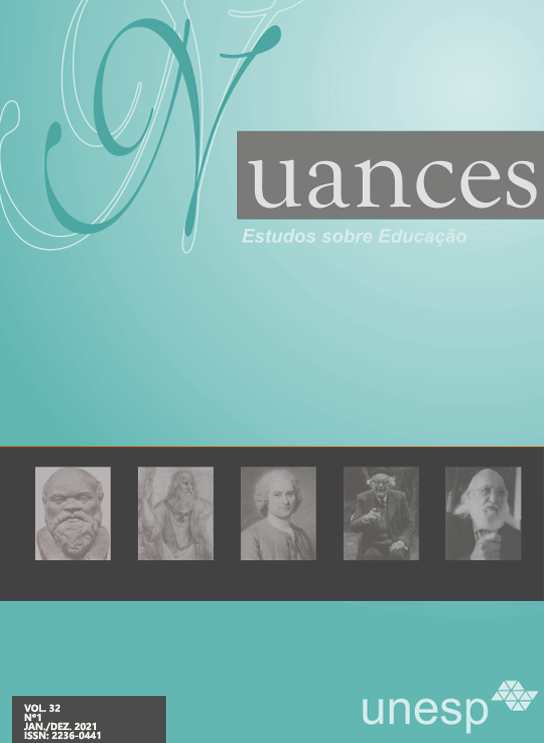Formação de prontidão de futuro especialista para auto-melhoria profissional
DOI:
https://doi.org/10.32930/nuances.v32i00.9130Palavras-chave:
Futuro arquiteto, Atividade professional, Preparação professional, Motivação, Escolha de carreiraResumo
O artigo examina o processo de desenvolvimento da preparação de um futuro especialista (a exemplo de um estudante de arquitetura) para o autoaperfeiçoamento profissional. A busca de métodos eficazes de treinamento de arquitetos no estágio atual atualiza os problemas de vários indicadores de seu profissionalismo, um dos quais é a prontidão para a atividade profissional e seu aperfeiçoamento. A realização das relações entre professores e estudantes contribui para a identificação do potencial criativo dos jovens. A administração e os professores do Departamento de Design e Belas Artes dão grande importância ao museu e à prática ao ar livre, onde os jovens têm a oportunidade de conhecer as obras-primas da cultura mundial e estudar os monumentos da arquitetura e da arte, cuja percepção ativa é parte integrante de sua futura profissão.
Downloads
Referências
BÍROVÁ, J.; KRUŽLÍK, P.; KALIMULLIN, A. M.; SOKOLOVA, N. L.; HAROUN, Z.; KRÁLIK, R.; VASBIEVA, D. G. Mathematical and Statistical Bibliometric Indicators for Scholars in the Field of Romance Languages and Linguistics. Eurasia Journal of Mathematics, Science and Technology Education, Eastbourne, v. 14, n. 12, em1638, 2018. https://doi.org/10.29333/ejmste/97826
BLINOVA, S.; DUGINA, T.; ZABOLOTSKIKH, A. Teaching mixed nationality groups (on the example of students from the Northern Caucasus region). In: INTERNATIONAL TECHNOLOGY, EDUCATION AND DEVELOPMENT CONFERENCE, 12., 2018, Valencia. Proceedings […]. Valencia: INTED2018, 2018. p. 7977-7982. https://doi.org/10.21125/inted.2018.1911
DOLZHICH, E.; DMITRICHENKOVA, S. Multimodality in education. In: INTERNATIONAL TECHNOLOGY, EDUCATION AND DEVELOPMENT CONFERENCE, 13., 2019, Valencia. Proceedings […]. Valencia: INTED2019 Proceedings, 2019b. p. 1980-1984. https://doi.org/10.21125/inted.2019.0561
DOLZHICH, E.; DMITRICHENKOVA, S. The phenomenon of texting. In: INTERNATIONAL CONFERENCE ON EDUCATION AND NEW LEARNING TECHNOLOGIES, 11., 2019, Palma. Proceedings […]. Palma: EDULEARN19 Proceedings, 2019a. p. 2309-2313. https://doi.org/10.21125/edulearn.2019.0628
DOLZHICH, E.; DMITRICHENKOVA, S.; PELÁEZ VERDET, A. Tools to improve foreign language teaching. In: INTERNATIONAL CONFERENCE OF EDUCATION, RESEARCH AND INNOVATION, 11., 2018, Seville. Proceedings […]. Seville: ICERI2018 Proceedings, 2018. p. 5673-5678. https://doi.org/10.21125/iceri.2018.2332
DOLZHICH, E.; DMITRICHENKOVA, S.; SANCHEZ POZUELO, Y. Foreign language teaching to Gen Z students (a case study of Spanish language). In: INTERNATIONAL TECHNOLOGY, EDUCATION AND DEVELOPMENT CONFERENCE, 15., 2021. Proceedings […]. INTED2021 Proceedings, 2021. P. 730-735. https://doi.org/10.21125/inted.2021.0181
DOLZHICH, E.; DMITRICHENKOVA, S.; SANCHEZ POZUELO, Y. Methods in industry-specific translator training. In: INTERNATIONAL TECHNOLOGY, EDUCATION AND DEVELOPMENT CONFERENCE, 14., 2020, Valencia. Proceedings […]. Valencia: INTED2020 Proceeding, 2020. p. 204-208. https://doi.org/10.21125/inted.2020.0101
DOLZHICH, E.; DMITRICHENKOVA, S.; SANCHEZ POZUELO, Y.; SHABANOVA, A. Distance learning in the context of COVID-19 pandemic. In: INTERNATIONAL TECHNOLOGY, EDUCATION AND DEVELOPMENT CONFERENCE, 15., 2021. Proceedings […]. INTED2021 Proceedings, 2021. p. 3549-3552. https://doi.org/10.21125/inted.2021.0736
DOLZHICH, Е.; DMITRICHENKOVA, S. Prior texts in science. In: INTERNATIONAL CONFERENCE ON EDUCATION AND NEW LEARNING TECHNOLOGIES, 10., 2018, Palma. Proceedings […]. Palma: EDULEARN18 Proceedings, 2018. p. 9574-9579. https://doi.org/10.21125/edulearn.2018.2293
GORDEEVA, T. O. Psihologija motivacii dostiženija [Psychology of achievement motivation]. Moscow: Smysl, 2006.
GOREV, P. M.; TELEGINA, N. V.; KARAVANOVA, L. Z.; FESHINA, S. S. Puzzles as a Didactic Tool for Development of Mathematical Abilities of Junior Schoolchildren in Basic and Additional Mathematical Education. Eurasia Journal of Mathematics, Science and Technology Education, v. 14, n. 10, em1602, 2018. https://doi.org/10.29333/ejmste/93675
MESHCHERYAKOV, B. G.; ZINCHENKO, V. P. Big psychological dictionary. Saint Petersburg: Prime-EUROZNAK, 2004.
SHAMOVA, T. I. Modular training: experience, perspectives. Moscow: Publishing house of the V.I. Lenin Moscow State Pedagogical University, 1998.
SHARIPOV, F. V. Pedagogy and psychology of higher education: textbook. Moscow: Logos, 2012.
SHARONOVA, S. A.; TRUBNIKOVA, N. V.; SOKOLOVA, N. L. Interpreting religious symbols as basic component of social value formation. European Journal of Science and Theology, Iași, v. 14, n. 3, p. 117-129, 2018. Available: http://www.ejst.tuiasi.ro/Files/70/10_Sharonova%20et%20al.pdf. Access: 20 Dec. 2021.
SHCHUKINA, G. I. [Revitalization of students’ professional activity in the educational process]. Moscow: Publishing House Knorus, 2014. In Russian.
SHLYAKHTINA, L. M. Imitacija professionalʹnoj dejatelʹnosti kak sposob aktivizacii samostojatelʹnoj raboty studentov [Imitation of professional activity as a means of stimulating students’ independent work]. Trudy Sankt-Peterburgskogo gosudarstvennogo instituta kulʹtury [Proceedings of St. Petersburg State Culture University], Saint Petersburg, v. 209, p. 91-94, 2015.
TEKUCHEVA, I. V.; GROMOVA, L. Y. On present state of teaching Russian language in Russia. International Journal of Environmental and Science Education, London, v. 11, n. 14, p. 6504-6511, 2016. Available: http://www.ijese.net/makale/936.html. Access: 20 Dec. 2021.
VASBIEVA, D. G.; SOKOLOVA, N. L.; MASALIMOVA, A. R.; SHINKARUK, V. M.; KIVA-KHAMZINA, Y. L. Exploring the EFL teacher’s role in a smart learning environment – a review study. XLinguae: European Scientific Language Journal, Nitra, v. 11, n. 2, p. 265-274, 2018. https://doi.org/10.18355/XL.2018.11.02.21
VOLKOVA, Y.; PANCHENKO, N. Diskursivnaja variativnostʹ konceptov destruktivnyh èmocij [Discourse variation of the concepts of destructive emotions]. Vestnik Rossijskogo universiteta družby narodov. Serija: Lingvistika [Russian journal of linguistics], Moscow, v. 22, n. 1, p. 175-194, 2018. https://doi.org/10.22363/2312-9182-2018-22-1-175-194
Downloads
Publicado
Como Citar
Edição
Seção
Licença
Atribuição-NãoComercial
CC BY-NC
Esta licença permite que outros remixem, adaptem e criem a partir do seu trabalho para fins não comerciais, e embora os novos trabalhos tenham de lhe atribuir o devido crédito e não possam ser usados para fins comerciais, os usuários não têm de licenciar esses trabalhos derivados sob os mesmos termos.





